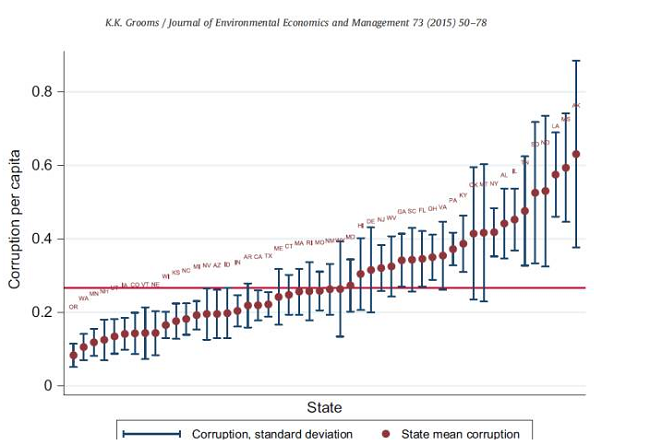关于管制俘获理论
观点 · 2004-12-16
返回miaoshiyang、beauty001
miaoshiyang:
本人正在做关于管制俘获理论的研究,特别是对该理论的实证分析。恳切盼望智者相助,并欢迎学术交流!
管制俘获理论从政府管制的利益导向着手,分析评判各种利益集团对管制政策形成的作用和导向的影响,并试图从总体上揭示政府管制的政策的局限性。该理论循着这样一种思路,对市场经济条件下政府管制可能存在的弊端进行了分析。
该理论的重要结论是:受管制企业为寻求垄断,而采取各种行为,在政府管制高层面上所产生的效用。与假定政府管制当局致力于追求社会公共利益目标的理论相反,政府管制实际上是为了满足产业对管制的需要而产生的,即所谓的立法者为产业所俘获;而管制当局最终会被产业所控制,即所谓的执法者为产业所俘获(Stigler,1971;Peltzmanm,1976)。在当前,管制俘获理论已经成为对政府管制最具挑战性的诘难。
beauty001:
Regulatory Capture
Recent Development In the Theory of Regulation M. Armstrong, D. Sappington
HIO Volume 3 Chapter 28
http://bear.cba.ufl.edu/sappington/PDF/Handbook%2006-03.pdf
REGULATORY CAPTURE: CAUSES AND EFFECTS By G. McMahon, BE, BCom, MEngSc, BSc, BEcon, MEconSt
http://www.iipe.org/conference2002/papers/McMahon.pdf
beauty001:
其实,管制俘获或规制俘获很多情况下是因为,规制机构在进行规制设计的时候,规制者(regulator)和被规制者(regulated firms)的信息不对成造成的;在获取被规制行业或企业的相关信息时,被规制企业在信息提供时存在着逆向选择,因而尽量提供有利于被规制企业的信息。
这样,在进行规制机制设计的时候,诱导被规制企业说真活的机制(truth-telling mechanism)就必须考虑进去;也就是考虑被规制企业的激励相容约束。
以上所说皆为本人一时所想,不当之处,敬请指教!
miaoshiyang:
我设计了一个“管制的激励制度”----
所谓激励就是要找到一个机制使得人们理性的自利行为结果正是所需的既定目标。我们这里论述的激励制度完全区别于通常意义的激励性管制,即给予受管制企业以竞争压力,提高生产效率和经营效率的正面诱因。在这里,激励制度的设计是完全内在于政府管制机构内部的。政府和企业都面临着一个对管制官员激励的问题。激励制度模型推导的目的就是要找到能使管制机构官员能够自觉抵制俘获的关键要素。
1) 基本假设
我们仍是沿用前面管制俘获的数学模型中的基本假设和结论,并进行相应扩展,以便更好地说明激励机制。
A 管制的三层等级结构:企业、管制机构、政府(代议机构);
B θ取θH、θL,分别代表不易俘获和易被俘获官员的两种类型;
C 管制机构官员的收入来源分为从政府得到的收入W1和从企业得到的转移支付W2,即W=W1 +W2 。此时管制机构官员在为政府任用的同时也被企业俘获,为企业效力,某种意义上成为企业的雇员;
D 设产出y为官员绩效的测度,y为官员努力水平e与官员类型θ的函数,即y=y(e,θ); 官员的效用函数u(W,e)=v(W-e(y,θ))=v(m),两类官员都具有相同的保留效用uˉ,它体现了官员的机会成本;
F 假定社会部剩余为S,S=∑(yi-wi),并以а比例在政府和企业之间分配,а∈(0,1);
G 政府与企业分别与管制机构官员签订契约。契约是一种规定支付-产出组合的激励方案,政府的理想契约为(W1,Y),企业的理想契约为(W2,y)。我们定义:所有能为官员接受的契约为可行契约,政府的偏好是维持一个庞大而相对廉洁的管制机构的最优契约,而使企业向官员支付W2 最小的契约是政府理想的最优契约。
2) 对管制机构的激励机制
为了说明转轨条件下的对管制机构激励机制,我们先从完全信息的条件入手。在完全信息条件下,假定政府与企业均能观察到官员的类型,他们要实现各自的最大化目标就要确定对每一个官员的支付,同时为使官员接受契约,政府和企业使官员获得的效用不能低于其保留效用。
A 对于任何一个官员,企业的问题是:
Max (1-а)(y-W1-W2)
S.t.v(W2-(e(y,θ)-e(Y, θ)))≥uˉ
由于政府理想契约中官员产业Y可能偏离企业利润最大化产出y,所以e(y,θ)-e(Y, θ)表示企业对额外努力的要求。建立拉格朗日函数:
L=(1-а)(y-W1-W2)+λ(v(W2-(e(y,θ)-e(Y, θ))-uˉ)
分别对y和W2 求导:
DL/Dy=1-а-λdv/dm De/Dy=0
DL/D W2=-1+а+λdv/dm =0
λ≥0 V≥0 λv=0
设y*H,y*L 分别为两类官员利润最大化时的产出。企业最优支付为企业向两类官员支付分别使其恰好达到零效用。
v(W2-(e(y,θ)-e(Y, θ))=0
W2=e(y,θ)-e(Y, θ) (1)
可见,企业向官员的最优支付(企业契约1)取决于其利润最大化时,官员的努力水平和政府向官员的契约。
B 在企业支付函数一定的条件下,政府的最优问题是:
Max а(y-W1-W2)
S.t. v(W1-e(Y, θ))≥uˉ
W2=(e(y*,θ)-e(Y, θ) y=y*
建立拉格朗日函数:
L=а(y*-W1-e(y*,θ)+e(Y, θ))+λ(v(W1-e(Y, θ)-uˉ))
分别对Y和W1 求导
DL/DY=аDe/DY -λdv/dm De/DY=0
DL/DW1=--а+λdv/dm =0
λ≥0 V-uˉ≥0 λ(V-uˉ)=0
可得 v(W1-e(Y, θ))=uˉ
W1=v-1(uˉ)+e(Y, θ) (2)
将(1)和(2)相加,
W=W1 +W2 =v-1(uˉ)+e(y*, θ)
C 政府最优契约结论
根据假设,政府偏好于W2最小化,所以当W2=0时,均衡结果为:
W1=v-1(uˉ)+e(y*, θ)
所以在完全信息条件下,政府对管制机构官员的最优激励契约(1)为;
W1H= v-1(uˉ)+e(y*H, θH) YH=y*H
-∞ YH≠y*H
W1L= v-1(uˉ)+e(y*L, θL) YL=y*L
-∞ YL≠y*L
据此,官员必须达到契约规定的产出水平,否则将有一个足够大的惩罚。政府在达到上述理想契约后,企业的最佳选择为不向官员提供任何支付。所以在完全信息下,不存在管制俘获行为。
miaoshiyang:
beauty001介绍的两篇文章实在不错,容我再细细专研,万分感激!
另,中国财经出版社的《世界银行1997年世界发展报告:变革中的政府》不知哪里能够得到。据说那里有很好的管制数据资料。
管制俘获与政府管制如影随形,无论是市场经济发达国家还是转轨国家,凡是实行政府管制的国度概莫能外。换言之,管制俘获成为客观存在。政府管制俘获的总体影响是增强了反政府管制的倾向,20世纪80年代以来出现的英美等国家大规模的私有化、取消管制、限制管制、回归市场的放宽管制(Deregulation)运动,就是对“福利国”和“管制国”无限扩张,“管制俘获”问题日益严重的深刻反思和彻底反叛。这一理论也为政府科学地制定和实施管制政策敲响了警钟。
区分市场经济发达国家和转轨国家两种不同的制度结构,分析管制俘获在两种不同制度结构中的不同成因以及特点是一个很值得去作的研究工作。
请问哪位学者对此有所建议?
beauty001:
Regulatory capture
The firm:
Cost C = (¯ ¡ e) q
¯ = ¯ (“efficient”) with probability º
¯ = ¯ (“inefficient) with probablity 1 ¡ º
e is effort, ª(e) cost of effort, ª0;ª00 > 0
The government collects revenue P (q) q and pays cost C. The firm also
gets a direct transfer t. The firm’s surplus is then U = t ¡ ª(e)
The regulator/agency:
Utility is determined by a transfer from the government, minus a reservation
“price”, s¤
Utility V (s) = s ¡ s¤
The regulator’s work results in a signal ¾ about the firm:
¾ = ¯ with probability »
¾ = nothing with probability 1 ¡ »
The regulator reports to Congress/the government:
the truth or perhaps, if ¾ = ¯, not the truth
The government / Congress:
W = U + V + S (q) ¡ P (q) q ¡
(1 + ¸) [s + t + C ¡ P (q) q]
Comments and implications:
¸ > 0 =) Congress finds it costly to transfer money to the firm or to the
agency
Timing: all learn their information, regulatory design t (C; q; r) and s (C; q; r)
is determined, side-payments can be agreed upon, the agency hands in a report
r...
If ¯ was always known, the firm would get t = ª(e¤), where e¤ is determined
by ª0 (e¤) = q (marginal cost equals marginal benefit)
If the agency is truthful (and since it does not always find out ¯) the firm
will have U ³¯´ > 0 and U ³¯´ = 0 when ¯ is not known. Optimal effort in
this case is less than e¤(to reduce the efficient firm’s rent)
The ¯-firm thus gets some additional rent when ¯ is not known.
The ¯-firm would thus be willing to pay/bribe the agency to withhold
information
The government knows this and to prevent information hiding (collusion
between firm and agency), the government gives the agency some extra surplus
if it reports ¯ and adopts an incentive scheme that gives the ¯-firm less
rent when ¯ is not known.
General point:
The possibility of capture affects policies (i.e. leads to extra money for
the agency, more cost-plus regulation for firms).
http://www.ne.su.se/education/grundutbild/cd/ht04/regul/lecturenotes7.pdf
zqdong:
5楼,以及各楼
请阅读Laffont和Tirole在近年关于规制收买的理论
若没有时间阅读论文,那么可阅读其著作
Laffont and Tirole,1993,政府采购与规制中的激励理论
Laffont,1999,Incentive and Political Economy
Laffont,2004, Regulation and Development
你们会发现,他们的研究已经多么精彩
另外,一楼若真能做出实证研究成果,是很有价值的。因为Laffont等都承认,他们的激励性规制理论现在很缺乏来自实证研究的检验。
beauty001:
Levine, M.E., “Regulatory Capture,” in New Palgrave Dictionary of Economics and the Law,
Vol. 3, pp. 267-271. (1998)
http://www.wcfia.harvard.edu/seminars/pegroup/levine.pdf
谢谢zqdong的建议,虽然俺的主要领域不在这里!
beauty001:
Incentives and Political Economy, 2000, Oxford University Press
Incentives and Political Economy constructs a normative approach to constitutional design using recent developments in contract theory. It treats political economy as the study of the incentive problems created by the delegation of economic policy to self-interested politicians. Politicians are treated successively as informed supervisors or residual decision-makers. The optimal constitutional responses to the activities of interest groups are characterized in various circumstances, as well as the optimal trade-off between flexibility of decision-making and discretion to pursue personal agendas when the incompleteness of the constitutional contract is recognized.
Contents/contributors
Chapter 1: Introduction
Part I: Politicians as Informed Supervisors
Chapter 2: The Complete Contract Approach to Constitutional Design
Chapter 3: An Incentive Theory of the Separation of Powers
Chapter 4: Checks and Balances
Part II: Flexibility versus Discretion in Constitutional Design
Chapter 5: Political Economy and Industrial Policy
Chapter 6: Political Economy and the Marginal Cost Pricing Controversy
Chapter 7: Toward a Political Theory of the Emergence of Environmental Incentive Regulation
Part III: Coalition Formation and Constitutional Design
Chapter 8: Optimal Constitutional Responses to Coalition Formation
Chapter 9: Collusion and Decentralization
Chapter 10: Concluding Remarks
Chapter 3 An Incentive Theory of the Separation of Powers
http://www.oup.co.uk/pdf/0-19-829424-7.pdf
beauty001:
Incentives and Political Economy,这本书武汉有。另外一本我就没有见过,应该是 Laffont 的遗著吧!
希望有的朋友可以介绍一下情况。
Regulation and Development,从书名看,应该是与Laffont and Tirole(1993)A Theory of Incentives in Regulation and Procurement, MIT Press ,互相补充或是进一步发展。
zqdong:
以下是引用beauty001在2004-12-14 19:40:00的发言:
Incentives and Political Economy,这本书武汉有。另外一本我就没有见过,应该是 Laffont 的遗著吧!
希望有的朋友可以介绍一下情况。
Regulation and Development,从书名看,应该是与Laffont and Tirole(1993)A Theory of Incentives in Regulation and Procurement, MIT Press ,互相补充或是进一步发展。
Regulation and Development的确是Laffont的遗著,剑桥大学出版社出版
是根据Laffont的讲义完成的,有些章节可以找Laffont相应的论文来读。
已有学者表示愿为国内读者翻译这本书,但主要是版权问题麻烦(出版商难对付)
此主题相关图片如下:
In Regulation and Development Jean-Jacques Laffont provides the first theoretical analysis of regulation of public services for developing countries. He shows how the debate between price-cap regulation and cost of service regulation is affected by the characteristics of less developed countries (LDCs) and offers a positive theory of privatization that stresses the role of corruption. He develops a new theory of regulation with limited enforcement capabilities and discusses the delicate issue of access pricing in view of LDC’s specificities. In the final chapter he proposes a theory of separation of powers which reveals one of the many vicious circles of underdevelopment made explicit by the economics of information. Based on organization theory and history, and using simple empirical tests wherever possible, Professor Laffont offers a comprehensive evaluation of the different ways to organize the regulatory institutions and opens up a rich new research agenda for development studies.
Contents
Foreword; Introduction; 1. Overview of regulatory issues; 2. The rent extraction-efficiency trade-off; 3. A positive theory of privatization; 4. Enforcement, regulation and development; 5. Access pricing rules for developing countries; 6. Universal service obligations in LCDs; 7. Design of regulatory institutions; 8. Separation of regulatory powers and development; 9. Concluding remarks.
Reviews
‘In this impressive manuscript, Jean Jacques Laffont shows why the regulation of infrastructure services is crucial to achieve equitable and sustainable expansion of infrastructure services in the poorest countries of the world. This new book by one of the fathers of the modern theory of regulation offers a huge first step towards a theory of regulation of network industries for developing countries and provides preliminary empirical tests of this theory. It opens a huge new research agenda for academics and helps practitioners improve their ability to provide effective policy advise. It is a required reading for anyone claiming to care for the effectiveness of the delivery of public services in developing countries.’ Antonio Estache, Senior Economic Advisor, The World Bank
‘The weak performance of public utilities and infrastructure in developing countries has been a serious drain on resources, a drag on growth and an obstacle to poverty reduction. The factors behind this weak performance are also those which limit the ability to regulate private monopolies in an effective and fair way. Thus understanding the problems of regulation and development is fundamental to policies shaping growth and poverty reduction. This book, by one of the most distinguished economic theorists of our time, is of great importance in providing a rigorous and thoughtful analysis of these crucial issues, which takes account of the practicalities of policy and delivery in developing countries.’ Professor Nicholas H. Stern, FBA 2nd Permanent Secretary, HM Treasury and Head of the UK Government Economic Service
http://bbs.efnchina.com/dispbbs.asp?BoardID=92507&id=49956




